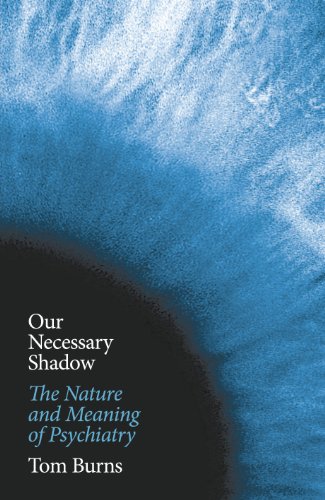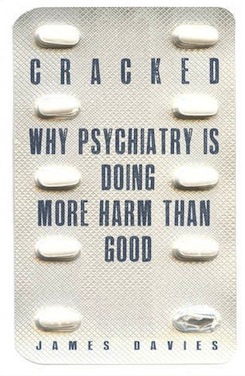Bryan Appleyard reviews two new books on the current state of psychiatry. Tom Burns seems to believe psychiatry is a human profession that has lost its way (beginning in the 1970s), while James Davies things psychiatry is "a botched discipline, a harmful, pill-popping fiasco created by callous pharmaceutical companies and corrupt practitioners."
Useful reviews - each book will likely appeal to different audiences.
Psychiatry on Trial
by Bryan Appleyard
SUNDAY TIMES, 03 JUNE 2013
Our Necessary Shadow: The Nature and Meaning of Psychiatry by Tom Burns; Penguin, pp. 350, $18.95 (Amazon)
Cracked: Why Psychiatry is Doing More Harm than Good by James Davies; Pegasus, pp. 327, $19.19 (Amazon; publication in August)In 1973, David Rosenhan, an American psychologist, published an article called On Being Sane in Insane Places. It told the story of an experiment in which eight perfectly sane people were sent to psychiatric hospitals. The only aberrant symptom they were instructed to display was that they occasionally heard a voice saying “Thud” or “Hollow”. All eight were admitted with diagnoses of psychosis — schizophrenia or bipolar disorder. They were treated with drugs and only discharged after days or, in some cases, many weeks, if they stated that they accepted their diagnosis.
Horrified by this, one hospital challenged Rosenhan to send fake patients and assured him they would detect them. Staff detected 83 fakes out of 193 new patients. In fact, Rosenhan had sent none. “No excuses could wash with such an embarrassment,” writes Tom Burns in Our Necessary Shadow, “something had to change.”
The Rosenhan Experiment appears in both Burns’s book and Cracked by James Davies. For Davies, it provides evidence that psychiatry is a botched discipline, a harmful, pill-popping fiasco created by callous pharmaceutical companies and corrupt practitioners. For Burns, it proves only that, in 1973, as so often happens in many fields, psychiatry had gone badly wrong. On the whole, Burns argues, it is a necessary and very humane pursuit.
This is an old confrontation. The movement known as anti-psychiatry emerged from 1960s counter-culture. The philosopher Michel Foucault and the psychiatrist RD Laing were its heroes; both saw psychiatry as a politically repressive force. Laing was the movement’s rock star. In 1969 he lectured students in Tokyo with such subversive passion that they at once burnt down the university administration building. But the sociologist Erving Goffman had the most lasting impact. His 1961 book Asylums more or less destroyed the old mental hospital culture — by identifying the way in which it enforced the formation of acquiescent personalities in the patients — and launched the more humane care systems in place today.
In fact, anti-psychiatry was merely the formalisation of the suspicion and anxiety that had always attended the experiments of the mind doctors. The superbly clear history that forms the core of Burns’s book makes it clear that progress has always been faltering. Treatments such as lobotomy, insulin shock and infecting patients with malaria were brutal and usually ineffective, but not always. Malaria infection worked well against a condition known as GPI (general paralysis of the insane) which was, it was finally discovered, caused by late-stage syphilis, a disease happily conquered by penicillin.
The story of GPI highlights the spectre that still haunts psychiatry. Until the syphilis diagnosis came along there was no known biological basis of the disease, so all proposed treatments were, in effect, guesses. Today there are still few conditions that have any clear physical cause. Depression has been linked to low serotonin levels in the brain — hence the Prozac generation of drugs — but the link is by no means certain and, in any case, that is only half an explanation since we don’t know why the levels are low.
This places a huge burden of responsibility on psychiatrists. Lacking a physical cause, diagnoses are dependent on their judgment. Various attempts have been made to formalise this process, notably the American Diagnostic and Statistical Manual of Mental Disorders (DSM), the latest edition of which has just been published. Since its first publication in 1952, this has been one of the most important books in the world because, by defining so many abnormal conditions, it also defines the normal. Davies argues — and Burns partly agrees — that the DSM has frequently been capricious and, indeed, imperialistic in its annexation of ever more territories of the human mind.
For Davies this is one more brick in the wall of his conviction that psychiatry is, in essence, a racket, primarily because of the iniquity of the big pharmaceutical companies and the level of corruption in psychiatry. He has plenty of horror stories of the deliberate suppression of negative data arising from drugs trials and of academics being bribed to say nice things about dubious products.
On top of that there is the ever-increasing medicalisation of the human mind. Sadness has become “clinical” depression and an unruly school pupil has Attention Deficit Hyperactivity Disorder (ADHD) and is likely to be dosed with Ritalin. This latter is still an unfolding scandal. A Canadian study, quoted by Davies, discovered an ADHD diagnosis was heavily dependent on the child’s birthday. Boys born in December (the cut-off date for entering the Canadian school year) are 30% more likely to be told they have ADHD than those born in January. The reason, it is suggested, is that being the youngest in the class is the source of stress.
Davies’s book is a potent polemic, spoilt by episodes of gross overwriting and self-glorifying descriptions of interview confrontations that add nothing to the argument. He also has, as one interviewee points out, an inherent bias, since as well as being an anthropologist he is also a psychotherapist — he embraces the “talking cure” rather than pill-popping.
Burns, however, painstakingly makes clear that psychiatry is emphatically not just about pills. It takes in a whole range of disciplines, including psychotherapy. Also, the pills that are popped are not as ineffective as Davies seems to suggest. Antipsychotic medications are undoubtedly effective, as are, though less consistently, antidepressants. Burns even defends electroconvulsive therapy as it is presently administered. He movingly describes a patient saved by the treatment from a suicidal spiral of depression.
In the end, Burns is probably right — that psychiatry is “our necessary shadow”. This is partly because the most severe mental illnesses cause some of the worst human suffering we can imagine and common humanity demands a response. But it is also because, as the mighty genius of Sigmund Freud demonstrated, this is, in a sense, a study of all that we are. Psychiatry, in short, is a faith to replace the faiths we have lost.


No comments:
Post a Comment